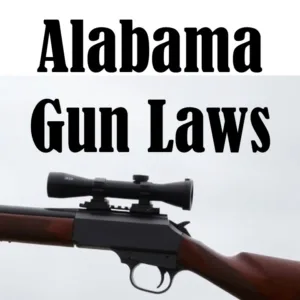Alabama is known for its strong support of Second Amendment rights, and the state’s gun laws reflect this by providing significant freedoms to firearm owners. However, there are still regulations in place that must be followed to legally purchase, carry, and possess firearms. Whether you’re an Alabama resident or visiting the state, understanding the key aspects of Alabama’s gun laws is essential to ensure compliance and avoid legal issues. This guide covers everything from open carry laws to purchasing firearms, concealed carry permits, and restricted areas.
Alabama Gun Laws Overview
Open Carry in Alabama
Alabama is an open carry state, which means individuals can openly carry firearms without a permit. This applies to any person who is at least 18 years old and legally permitted to possess a firearm under state and federal law. While open carry is generally allowed, certain restrictions apply to specific locations.

Who Can Legally Own a Firearm in Alabama?
To legally own a firearm in Alabama, you must:
- Be at least 18 years old to possess a firearm.
- Be at least 21 years old to purchase handguns.
- Not be a convicted felon, unless your civil rights and firearm rights have been restored.
- Not have been convicted of a domestic violence offense or be under a restraining order.
- Not have been adjudicated mentally defective or committed to a mental institution.
- Not be addicted to drugs or alcohol.
Purchasing a Firearm in Alabama
Alabama does not require a permit to purchase a firearm, but certain federal restrictions and background checks still apply. There is no waiting period for firearm purchases in Alabama, and private sales between individuals are not subject to background checks.
Handgun Purchases
- Federal law requires individuals to be at least 21 years old to purchase a handgun from a licensed dealer.
- Background checks are conducted through the National Instant Criminal Background Check System (NICS) for all purchases from licensed dealers.
- Private sales of handguns do not require a background check, though it is illegal to knowingly sell a firearm to someone prohibited from owning one.
Long Gun Purchases
- Long guns (rifles and shotguns) can be purchased by individuals 18 years or older.
- There are no background check requirements for private sales of long guns.
Concealed Carry Permits in Alabama
Alabama has recently become a permitless carry state, meaning individuals no longer need a permit to carry a concealed firearm as of January 1, 2023. This applies to both residents and non-residents who are legally allowed to possess a firearm.
Alabama Pistol Permit (Concealed Carry Permit)
While a permit is no longer required to carry a concealed firearm, Alabama continues to offer the Alabama Pistol Permit for individuals who wish to have a permit, especially for those who travel to other states that honor Alabama’s concealed carry permit.
How to Obtain an Alabama Pistol Permit:
- Be at least 18 years old.
- Submit an application to your local county sheriff’s office.
- Pass a background check, which includes a review of criminal and mental health history.
- Pay the application fee, which varies by county (typically between $20-$30).
- The sheriff’s office will issue or deny the permit based on your eligibility.
The Alabama Pistol Permit is valid for one to five years, depending on the applicant’s choice, and offers reciprocity with many other states that require a permit for concealed carry.
Where Can You Carry a Gun in Alabama?
While Alabama is a permitless carry state, there are still restrictions on where firearms can be carried, both openly and concealed. Some of the prohibited locations include:
- Schools: Firearms are prohibited in K-12 schools, including school events and buses, unless you have written permission from the school administration.
- Government Buildings: Firearms are not allowed in courthouses, police stations, and other government buildings.
- Police Stations: Carrying firearms into police or sheriff’s offices is prohibited.
- Private Property: Property owners can prohibit firearms on their premises by posting signs. It is important to respect “No Firearms” signs on private property.
- Secure Areas: Firearms are not allowed in areas that are designated as secure, such as airports and certain parts of correctional facilities.
Violating these location-specific rules can lead to criminal charges, fines, and revocation of gun rights.
Alabama’s Stand Your Ground and Castle Doctrine
Alabama has both Stand Your Ground and Castle Doctrine laws, which provide legal protections for individuals who use deadly force in self-defense.
Stand Your Ground
Alabama’s Stand Your Ground law allows individuals to use deadly force in self-defense without the duty to retreat, as long as they believe they are in imminent danger of death, serious bodily harm, or the commission of a forcible felony.
Castle Doctrine
Alabama’s Castle Doctrine applies to individuals defending themselves in their homes, vehicles, or places of business. Under this doctrine, individuals are not required to retreat and are presumed to have a reasonable fear of harm if someone unlawfully enters their home or vehicle.
Firearm Restrictions in Alabama
Despite Alabama’s permissive gun laws, certain individuals and firearms are restricted:
- Convicted Felons: Felons cannot possess firearms unless their civil rights and firearm rights have been restored by the state.
- Domestic Violence Offenders: Individuals convicted of misdemeanor domestic violence offenses or those subject to a restraining order cannot possess firearms.
- Prohibited Firearms: Fully automatic weapons and other NFA-regulated firearms (such as suppressors and short-barreled rifles) are allowed in Alabama, but they must comply with federal law, including registration and a federal tax stamp.
- Suppressors: Suppressors are legal in Alabama, but like other NFA items, they require federal approval and registration.
Reciprocity with Other States
Alabama has reciprocity agreements with many other states, meaning Alabama’s concealed carry permits are recognized in those states. Similarly, Alabama recognizes valid concealed carry permits from other states. However, gun laws vary significantly between states, so it’s important to check local laws when traveling with a firearm.
Penalties for Violating Gun Laws in Alabama
Violating Alabama’s gun laws can result in serious penalties, including fines, imprisonment, and the loss of firearm rights. Some common offenses include:
- Carrying a Concealed Firearm Without a Permit (Prior to 2023): This is no longer applicable due to permitless carry, but individuals must still follow laws about where firearms are allowed.
- Possession of a Firearm by a Prohibited Person: Convicted felons, domestic abusers, and those deemed mentally unfit can face felony charges and imprisonment for possessing a firearm.
- Carrying a Firearm in a Prohibited Area: Violating location-specific restrictions can result in criminal charges, fines, and possible revocation of the right to carry a firearm.
Conclusion: Understanding and Complying with Alabama Gun Laws
Alabama’s gun laws offer significant freedoms for responsible firearm owners, particularly with the adoption of permitless carry. However, it is essential to understand the restrictions that still apply, especially when it comes to where firearms can be carried and who is eligible to possess them.
For those who frequently travel, obtaining an Alabama Pistol Permit remains beneficial, as it allows you to legally carry in states that recognize Alabama’s permit. Staying informed about both Alabama’s gun laws and any changes to them will ensure you exercise your Second Amendment rights responsibly.
FAQs About Gun Laws in Alabama
1. Is open carry legal in Alabama?
Yes, open carry is legal in Alabama for individuals who are at least 18 years old and legally allowed to possess a firearm.
2. Do I need a permit to carry a gun in Alabama?
No, as of 2023, Alabama is a permitless carry state. However, a permit is still available for those who want one, especially for reciprocity in other states.
**3. Can I carry a firearm in a vehicle without a permit?**
Yes, as of 2023, you can carry a firearm in your vehicle without a permit. The firearm does not need to be unloaded or secured in any specific way, but all federal and state laws still apply regarding who can possess a firearm.
4. Are background checks required for private firearm sales in Alabama?
No, Alabama does not require background checks for private sales of firearms between individuals. However, it is illegal to sell a firearm to someone you know or reasonably believe is prohibited from possessing one.
5. Can non-residents carry concealed in Alabama?
Yes, non-residents who are legally allowed to possess a firearm may carry concealed in Alabama without a permit, as the state recognizes permitless carry. However, non-residents who travel frequently may still apply for an Alabama Pistol Permit.
6. What happens if I carry a firearm in a prohibited area?
Carrying a firearm in a restricted area, such as a school or government building, can result in criminal charges, fines, and even imprisonment. It’s essential to know the restricted areas to avoid legal trouble.
